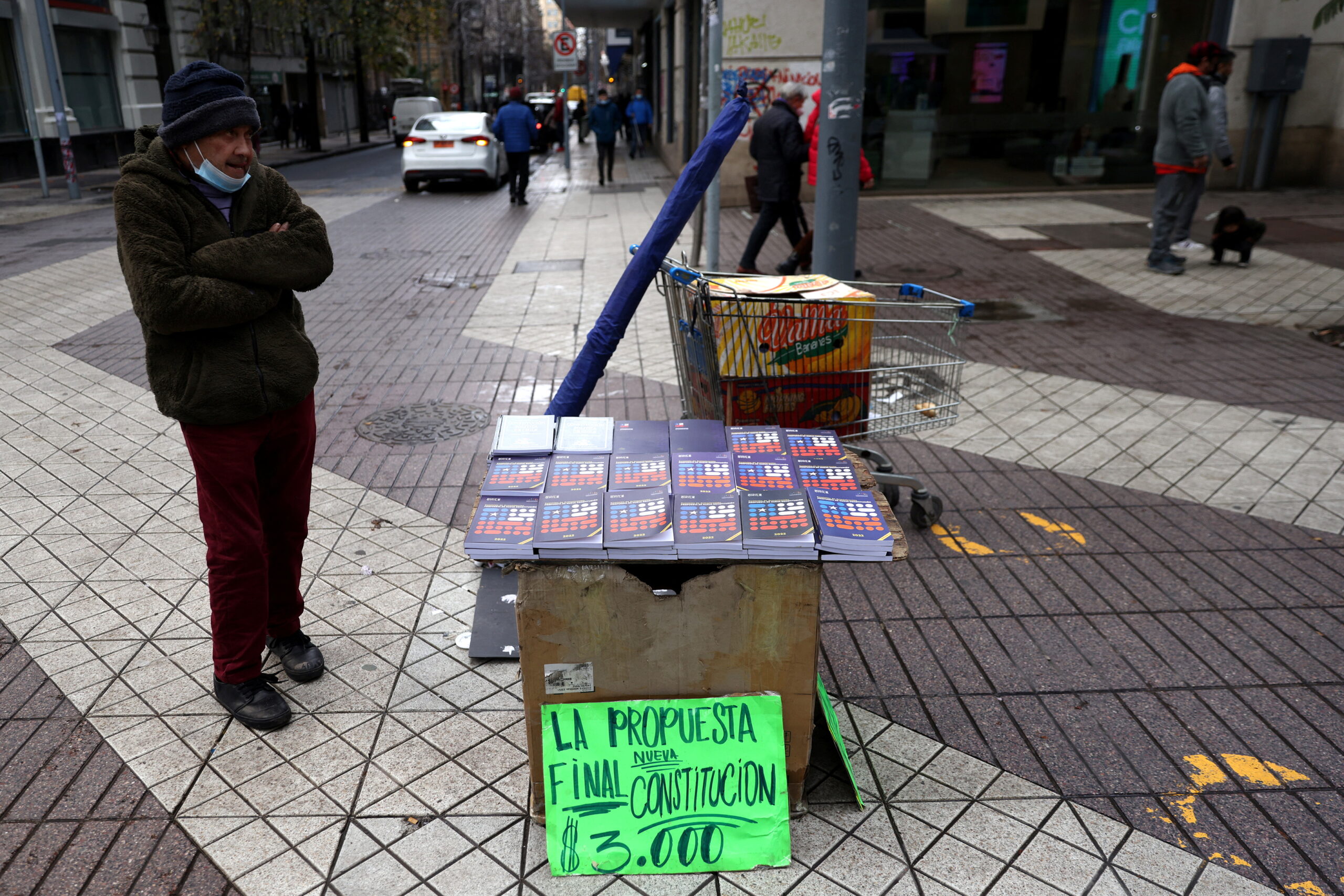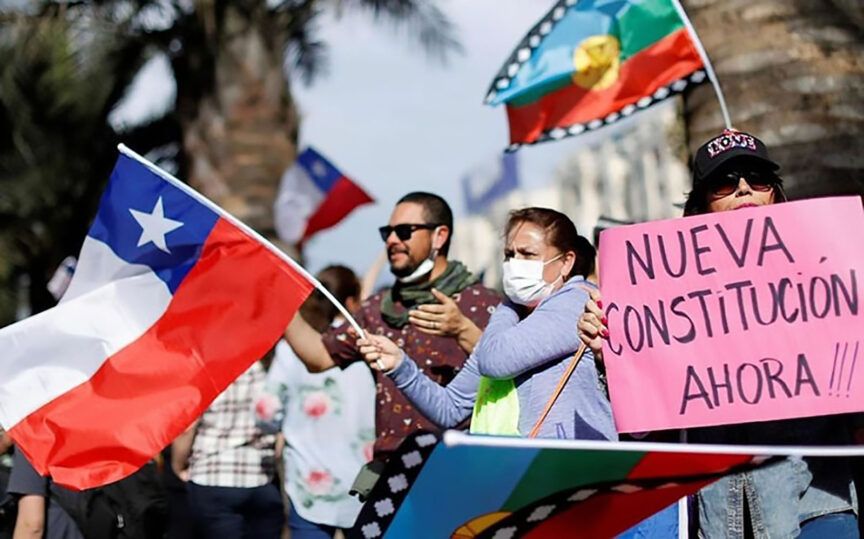Chile’s Proposed New Constitution Could Be a Nail in the Coffin of Neoliberalism
And that's why the right are trying to kill it at birth.
by Michael Chessum
31 August 2022

On Sunday, the people of Chile will vote on what kind of country they want to live in.
Under the dictatorship of Augusto Pinochet from 1973 to 1990, Chile became a petri-dish for neoliberalism, in which economic deregulation and privatisation went alongside brutal repression of the left and the labour movement. When the dictatorship ended, the economic model persisted, as did the constitution enshrining it. This week, voters will have the opportunity to either approve a new constitution – securing a progressive future – or reject it, instead keeping the 1980 draft, a hark back to an authoritarian past.
“It feels like we’ve been in a state of polarisation for a long time now,” says Lieta Vivaldi, a lawyer and leading feminist activist based in Santiago. “The approve side is mobilising people in big numbers and having a lot of conversations [and] workshops and [producing] audio-visual content. We are trying to create an atmosphere of hope and creativity. But there’s a real sense of anxiety and tension in the air.”
With just days to go, polls show a consistent double-digit lead for reject, amid a campaign dominated by misinformation and dark money. A series of ‘ghost organisations’ have been buying expensive radio ads on behalf of reject; meanwhile, fake stories portraying the constitution as authoritarian and harmful regularly pop up on social media and are reflected back by much of the press and broadcast media.
In one bizarre episode, footage of the Santiago marathon was doctored and presented as a well-attended reject rally. “It was like the Trump inauguration controversy,” says Javier Sajuria, a Chilean political scientist based at Queen Mary university in London. “The political atmosphere in Chile is incredibly toxic. And the ideas that are being spread about the constitution – that people will lose their houses, or lose their education provision, or that the new political system is about installing an authoritarian regime and destroying private property – these aren’t just bad faith interpretations, they’re deliberate misinformation.”
While the referendum campaign has not yet witnessed the level of political violence seen in Chile’s recent history, tensions are high. At one campaign rally over the weekend, a reject voter attempted to charge supporters of the new constitution on horseback.
A turning point.
The draft constitution is a product of the ‘social explosion’ that tore through Chile’s towns and cities in the spring and summer of 2019. What began as a strike of school students protesting a minor rise in Santiago metro fares, transformed into widespread protest and rioting, and faced violent state repression.
The upheaval eventually brought together a vast social coalition, well beyond the confines of the political left. This fused with existing social movements, most prominently a growing and well-organised feminist movement. Assemblies sprung up all over the country, organising protests and mutual aid.
In the face of overwhelming social pressure, politicians from all major parties (with the exception of the Chilean communist party) agreed a plan which effectively demobilised the protests by offering a referendum on drafting a new constitution. This referendum, delayed by Covid to October 2020, was won with a 78% majority.
In May last year, elections to the constitutional convention were dominated by pro-reform independents and the official left coalition, Apruebro Dignidad – an alliance between the communist party and the politically diverse Broad Front, which can trace its roots to the student uprising of 2011. Gabriel Boric was one of the leaders of that student movement, and his election as president in December 2021, running on the Apruebro Dignidad ticket, marked the beginning of Chile’s first left government since Salvador Allende.

Chile’s current constitution – in addition to promoting the family as “the fundamental nucleus of society” – effectively locks in the privatisation of basic services. The new draft would transition Chile away from a state that provides services only where the private sector cannot, to one that guarantees rights like healthcare, housing, education, water, abortion and digital connectivity. It was drafted by a convention with a fifty-fifty gender split, and substantial representation from Indigenous groups.
Despite a fierce battle playing out on the ground, in many ways the draft constitution is actually very modest in its ambitions. Noam Titelman is a Broad Front activist who was, like Boric, a leader of the 2011 student protests. “On economic and governmental issues, it’s not radical – it’s at most progressive,” he says. “It guarantees rights on paper, but then leaves it to the law to decide what that means, and it could mean very different things depending on who has the presidency or a majority in the parliament. This is mostly about removing barriers to change rather than forcing our programme into the text itself.”
While the Economist piously condemned the new constitution as a “fiscally irresponsible left-wing wish list”, even many capitalists aren’t that bothered. Noting that the most radical economic measures had been defeated in the constitutional drafting process, Morgan Stanley’s assessment was that the new text “should reduce political uncertainty for entrepreneurs, promote investment and maintain a largely orthodox fiscal framework”.
In some areas, however, the constitution is unarguably ground-breaking. “We got pretty much everything we campaigned for,” says feminist activist Vivaldi: “That was something we never expected.” As a result, Chile could become the first country in the world with a 50% quota for women, not just in parliament but across the state’s decision-making apparatus. A constitutional right to abortion would be equally unprecedented, and in a country that currently has some of the most restrictive abortion laws in South America. For the first time, Chile would be recognised as a plurinational state, with Indigenous communities gaining some autonomy and power. Ecological sustainability would be written into the country’s DNA.
What now?
Proponents of the new draft constitution are struggling because of the sheer scale and complexity of what they have to communicate. This vote is about the shifting sands of Chilean politics.
“If we go back a few years,” says Titelman, “social rights – to housing, to health, and so on – were at the top of the agenda. Now, the conversation is more about cost of living and a perception of rising crime.” In the north of the country, which has seen an influx of Venezuelan migrants in recent years, immigration continues to be the main dividing line in politics. Further south, hostility to Indigenous communities has been sharpened. “Beyond the article-by-article discussion, there is an intensifying struggle about Chilean identity – it’s culture wars, but with lots of additional context.”

The campaign for a new constitution has, since the ‘social explosion’ of 2019, been an untameable, and to an extent leaderless, movement. It belongs to no single political organisation or ideological perspective, and its spokespeople are whoever happens to be on stage or in front of a mic – no matter their formal rank. This fact has given it a creative and authentically anti-establishment image, but it has also produced a string of absurd spectacles which the Chilean right has been adept at weaponising.
As the campaign entered its final week, one of the most talked-about events was a family-friendly approve rally in Valparaiso organised by leftwing mayor Jorge Sharp, at which one of the scheduled acts performatively pulled an entire Chilean flag out of a fellow performer’s anal cavity. Unsurprisingly, far-right presidential candidate Jose Antonio Kast took to social media to decry the incident as “the legacy of the convention”.
Between now and Sunday, the movement for a new constitution, with all its diversity and determination, will be pitched against a stubborn status quo. The fact that voting is compulsory, with millions of people participating for the first time, adds a great deal of uncertainty, and there is no consensus among activists about which way the result will go. Victory would change Chile forever, and light a beacon for the left across the world – but it would not, on its own, stop the onward march of the identitarian far right. Defeat would be a major setback for social reform, and could even reignite the social unrest of recent years. To deliver on his promises, Boric would have to find another way to change the constitution. Either way, the fight for Chile’s soul will be far from over.
Michael Chessum is a socialist activist and writer based in London.


